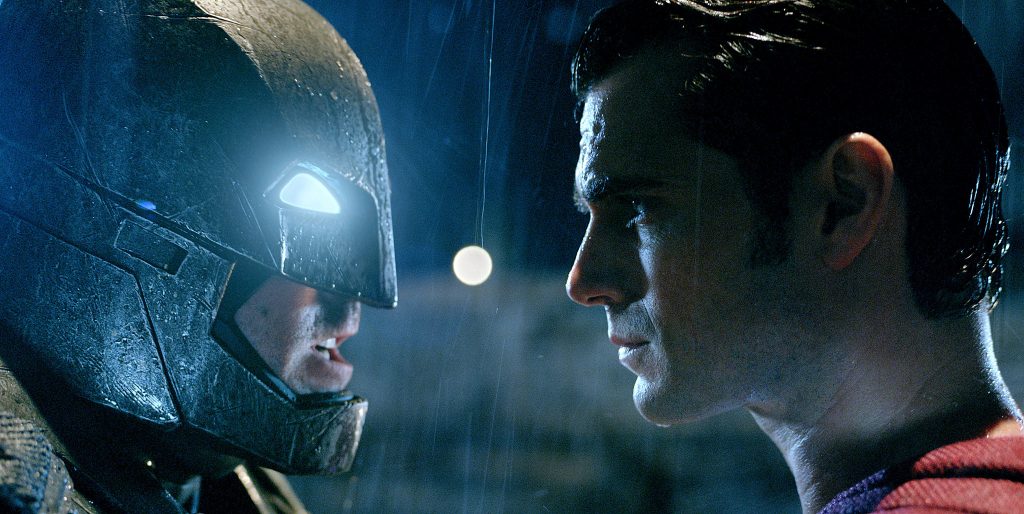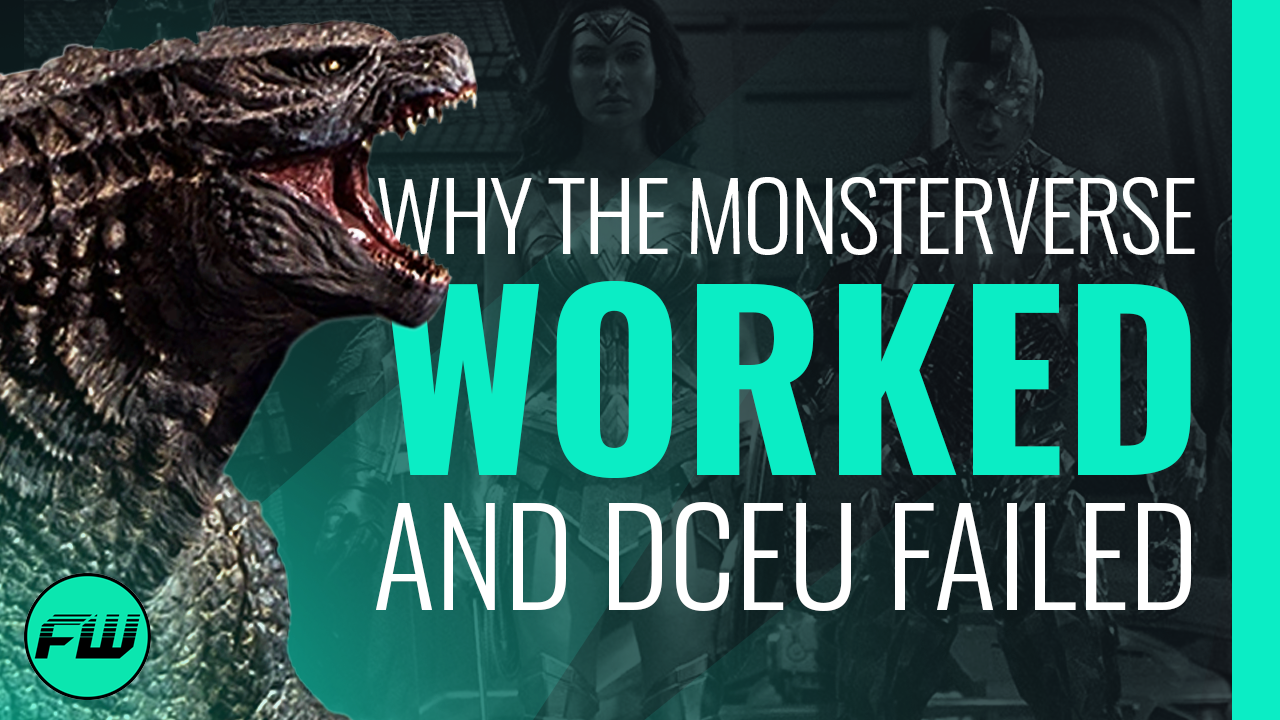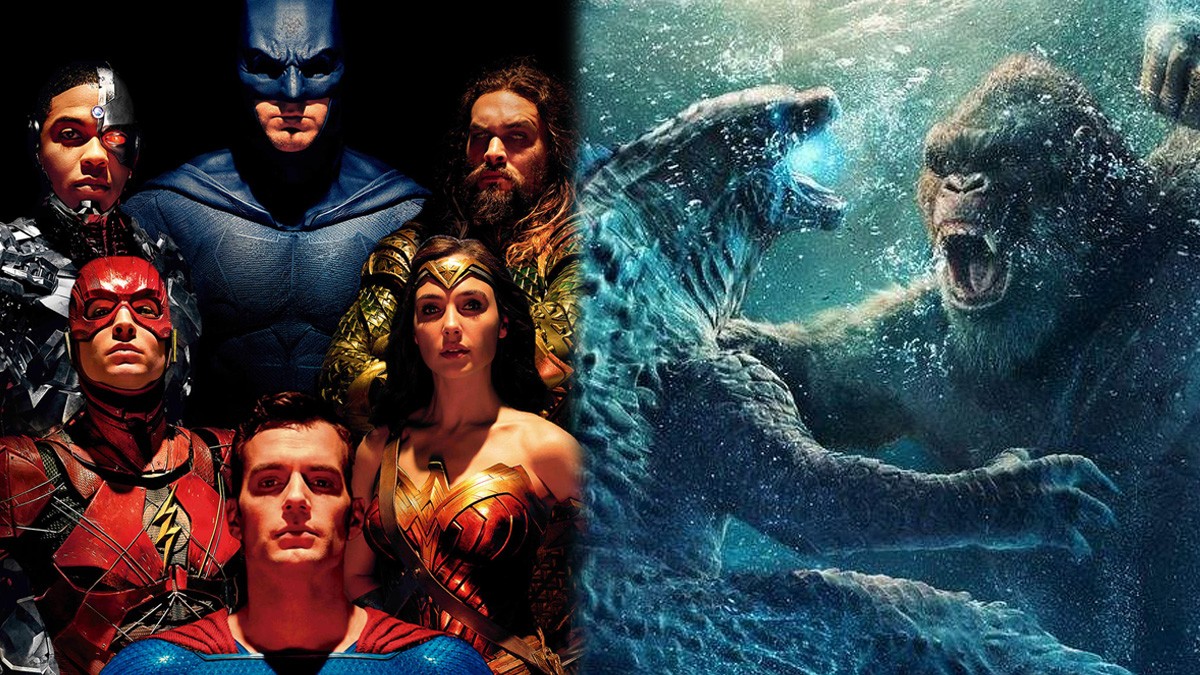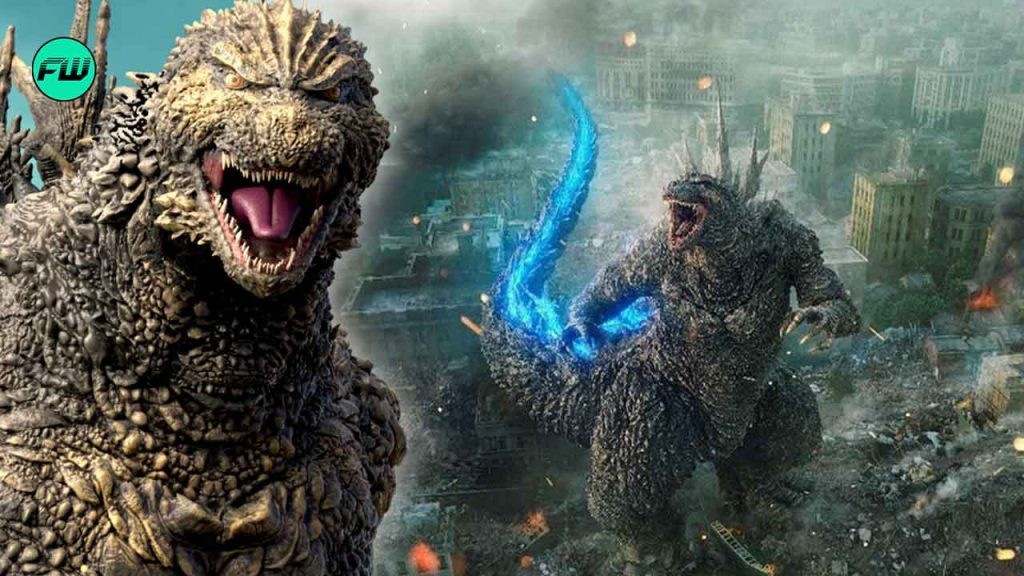In this FandomWire Video Essay, we explore why the Monsterverse worked and the DCEU failed.
Check out the video below:
Since debuting in 2013, the DC Extended Universe has been one disaster after another for Warner Brothers. Massive critical and fan backlash, constant shake-ups in creative direction, and increasingly dwindling box office plagued the once promising franchise before it was finally put out of its misery by The Flash; though Blue Beetle and Aquaman and the Lost Kingdom might still be canon depending on who you ask.
Yet at the same time, WB has helped spearhead another cinematic universe that might be the only one besides Marvel to work out in the long run. The Monsterverse: a series of films and TV shows adapting beloved Japanese kaiju such as Godzilla, alongside original monsters and American icon King Kong for good measure. Since its 2014 debut, the Monsterverse has gained a massive fan base and mostly positive critical reception while continuing to perform very well at the box office; with 2021’s Godzilla vs. Kong making nearly half a billion dollars worldwide despite releasing day-and-date on streaming.
So, what exactly happened here? In an era where every studio is desperate for a cinematic universe, how did WB, with two of them, get one so right and the other so wrong? The reasoning behind this can be essentially broken down into three main categories: the foundation set by each franchise’s first entry, the way each franchise responded to audience feedback, and each franchise’s use of creative collaboration, or lack thereof. So suit up and prepare for the ultimate showdown as we explore why the Monsterverse works and the DCEU doesn’t.
Foundation
The first entries for both of these franchises had a lot to prove when they initially released. 2014’s Godzilla was the first new Godzilla film since the divisive Final Wars ten years earlier and the first American adaptation since the infamous 1998 film. And 2013’s Man of Steel had it even worse. Not only was it the first big-screen adaptation of Superman since the polarizing Superman Returns in 2006 and the end of Smallville’s ten-season tenure in 2011; it also now had to live up to Christopher Nolan’s groundbreaking Dark Knight trilogy and the game-changer that was and is 2012’s The Avengers. Godzilla and Superman were and are pop culture icons, but with so much competition in the modern era, their comebacks needed to make an impression.
While both films are far from perfect, Godzilla (2014) is by far the stronger of the two. Though many have criticized the film for focusing too much on the human characters at the expense of Godzilla’s screen time, this was a clear and intentional artistic decision by director Gareth Edwards. Throughout the film. Edwards only gives brief glimpses at the titular King of the Monsters, with the first full-body shot not occurring until around the halfway point. And up until the climax, he almost always cuts away from the action to focus on the human consequences of these monster battles. While some have understandably found this frustrating, it does help ground the stakes and make the final battle that much more impactful. The film ultimately has more in common with something like Steven Spielberg’s Jaws than most of the fast-paced summer action movies of its time; with Michael Compton of Bowling Green Daily News praising it as “a slow-building summer blockbuster that rewards a patient audience with some fantastic visual sequences in the final third.”
Even if you disagree with Godzilla (2014)’s creative decisions, they were at least decisions. By contrast, Man of Steel is so concerned with keeping in line with other popular superhero movies and loudly declaring how different it is from previous Superman adaptations that it never figures out what it truly wants to be. The origin is told out of order not because it makes sense for the character, but because that’s how it was told in Batman Begins. The large-scale destruction of Metropolis in the climax happens not because that’s how Superman would realistically approach the fight, but because New York was destroyed at the end of The Avengers. And Superman kills Zod not because it’s what he would actually do, but because it’s different from other adaptations. The realistic sensibility of Christopher Nolan’s screenplay and the emphasis on spectacle by director Zack Snyder simply don’t mesh well and it leaves Man of Steel without a coherent identity of its own; with Patrick Cavanaugh of The Wolfman Cometh stating “While it might set itself apart from other superhero movies that came before it, it seems to do so arbitrarily as opposed to exploring those ideas in any organic way.”
Feedback
Critiques aside, Godzilla (2014) and Man of Steel were both massive financial successes, meaning that follow-ups were inevitable. When crafting the Monsterverse, frequent WB partner Legendary Pictures had a central goal in mind as early as 2015. Have every entry eventually lead to Godzilla vs. Kong, with the secret organization Monarch, introduced in Godzilla (2014), serving as the main connecting thread between all of them; continuing to do so even after GvK in both the Skull Island animated series and Monarch: Legacy of Monsters. Throughout its existence, the Monsterverse remained committed to a strong narrative core and central throughline, while still taking audience reception into account. The greater focus on the monsters themselves compared to the humans and the more frequent use of pre-established recognizable monsters like Mothra and Mechagodzilla in later entries were direct responses to criticisms of the 2014 film.
By comparison, the DCEU’s origins were based not on anyone at Warner Brothers particularly wanting to make a shared DC Universe, but because Marvel’s success with The Avengers made them feel like they had to. This lack of identity meant that the DCEU was simultaneously too committed to its direction and not committed enough. 2016’s Batman v. Superman: Dawn of Justice crams Batman’s origin, the initial meeting of Batman and Superman, Lex Luthor, Wonder Woman, the Justice League, and Doomsday into one story that struggles to satisfy everyone and ultimately doesn’t satisfy anyone; all in the service of getting to a Justice League movie as fast as possible. Its attempts to respond to Man of Steel critiques feel rushed, such as when a news report clarifies that all the buildings about to be destroyed in the battle between Batman, Superman, Wonder Woman, and Doomsday were conveniently empty before the fight even began.
Yet the franchise has also demonstrated a severe lack of commitment to its own ideas upon even the slightest hint of backlash. The overwhelming rejection of Batman v. Superman’s darker tone combined with the success of Deadpool earlier that year led to WB frantically re-editing and reshooting 2016’s Suicide Squad into a much more comedic film than it was ever intended to be, resulting in a tonally disjointed and critically reviled final product, with Keith & The Movies’ Keith Garlington slamming its “bad pacing, horribly chopped up story structure, and dull forgettable action.”

The poor critical reception of both BvS and Suicide Squad would eventually lead WB to scrap plans for a two-part Justice League film in favor of a single standalone entry. And when Zack Snyder was forced to step away from the project due to a family tragedy, the studio brought in Avengers director Joss Whedon to rework the movie into something more in line with Whedon’s previous work. Once again, WB’s panicked attempts to course correct instead of sticking to one idea and evolving it over time backfired tremendously; with 2017’s Justice League bombing at the box office and even the DCEU’s remaining fans demanding a return to Snyder’s original vision; which they would eventually get with Zack Snyder’s Justice League in 2021.
Creative Collaboration
But the biggest difference between these two franchises is how WB collaborates with others within them. For the Monsterverse, WB is primarily in charge of distribution and marketing, while leaving much of the creative work to Legendary Pictures; alongside some supervisory input from Toho, the original creators of Godzilla. WB and Legendary also work alongside Netflix and Apple TV for Skull Island and Monarch: Legacy of Monsters respectively. This multi-studio collaboration, alongside the consistent leadership of Legendary founder and former CEO Thomas Tull, allows for greater checks and balances within the franchise.
But the Monsterverse also has frequent collaborators on the creative side. Screenwriter Max Borenstein has contributed to every film in the franchise since the beginning, King of the Monsters director Michael Dougherty helped out on Godzilla vs. Kong’s story, and both GvK’s director and composer, Adam Wingard and Junkie XL respectively, will return for Godzilla x Kong: The New Empire. Additionally, actors such as Ken Watanabe, Millie Bobby Brown, and John Goodman reprise their roles across multiple installments.
By contrast, Warner Brothers only answers to itself with the DCEU and didn’t even establish a formal DC Films imprint until after Batman v. Superman released. Overall direction of the franchise was initially and informally given to Zack Snyder himself, then handed off to Geoff Johns and Jon Berg when DC Films was founded. Leadership changed AGAIN when Walter Hamada was brought on in 2018; before finally handing things off to James Gunn and Peter Safran in 2022, rebranding to DC Studios.
On top of the constantly rotating corporate leadership, the aforementioned creative shifts on Suicide Squad and Justice League led to constant clashes between actors, directors, and the studio itself. The production of Ben Affleck’s solo Batman film went so poorly between him and Warner Brothers that it eventually morphed into a separate project altogether in Matt Reeves’ The Batman. The studio was so indecisive about what they wanted to do with Superman that Henry Cavill’s contract expired and for a brief period, the character only appeared in shadow or as a headless torso such as at the end of 2019’s Shazam movie. Despite having some of the most iconic comic book characters at their disposal, Warner Brothers’ slap-dash approach to storytelling and production management drove many people away from working with them, and understandably so.
The Monsterverse and the DCEU both started on arguably rocky foundations; but while the Monsterverse remained committed to a narrative goal while steadily improving its output, the DCEU swerved in every direction it possibly could, squandering its own potential in the process. However, not all hope is lost for DC. The leadership of a filmmaker as talented and experienced as James Gunn could give the rebooted DCU the kind of focus that has helped the Monsterverse achieve the success that it has. And if the Monsterverse can bounce back from the mixed critical reception and underwhelming box office of King of the Monsters, who’s to say that DC can’t bounce back from its shortcomings? Regardless, when you look at the commitment to a narrative goal, the greater emphasis on creative collaboration, and overall audience enthusiasm, it’s abundantly clear why the Monsterverse works and the DCEU doesn’t.
Now, we want to hear from you. Do you agree that the Monsterverse works better than the DCEU? Do you prefer the DCEU’s approach? And what’s your favorite entry in both franchises? Let us know in the comments below and as always, be sure to like, subscribe, and hit the notification bell so you never miss a video. Until next time, thanks for watching.
Follow us for more entertainment coverage on Facebook, Twitter, Instagram, and YouTube.



